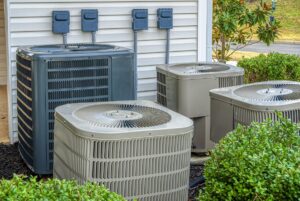What Factors Affect Air Conditioning Efficiency?

Air conditioning is an essential part of our daily lives, especially during the hot summer months. It keeps us comfortable and cool, but it can also significantly affect our energy bills. The more efficient our air conditioning unit is, the lower our energy bills will be.
But what exactly affects the efficiency of our air conditioning? In this article, we will discuss the factors that can affect air conditioning efficiency in your home and how you can improve it.
Factors Affecting Air Conditioning Efficiency
1. Age and Maintenance of the Unit
As with any appliance, the age and maintenance of your air conditioning unit play a significant role in its efficiency. An older unit that has not been properly maintained will have to work harder to cool your home, resulting in higher energy consumption and bills. Regular maintenance, such as cleaning or replacing filters, can help improve the efficiency of your air conditioning unit.
2. Size and Capacity
The size and cooling capacity of your air conditioning unit also affects its efficiency. An undersized unit will have to work harder to cool a larger space, while an oversized unit may cycle on and off too frequently, leading to energy wastage. It is essential to choose the right size and capacity for your home to ensure optimum efficiency.
3. Insulation and Ductwork
Proper insulation in your home can significantly impact the efficiency of your air conditioning unit. Good insulation can help keep cool air inside and prevent hot air from entering, making your unit work more efficiently. Similarly, ductwork that is poorly designed or has leaks can result in energy loss and reduce the efficiency of your unit.
4. Location of the Unit
The location of your air conditioning unit can also affect its efficiency. Units that are exposed to direct sunlight will have to work harder to cool the air, while units located in shaded areas will not have to work as hard. It is best to keep your unit in a shaded area or provide adequate shading for it.
5. Climate and Temperature
The climate and temperature of where you live can also impact the efficiency of your air conditioning unit. For example, if you live in a hot and humid climate, your unit will have to work harder to cool the air, resulting in higher energy consumption. It is essential to consider these factors when choosing an air conditioning unit for your home.
6. Energy-Efficient Options
If you are looking to improve the efficiency of your air conditioning unit, there are several energy-efficient options available in the market. These can include units with a higher Seasonal Energy Efficiency Ratio (SEER) rating, which measures the cooling output of the unit compared to its energy consumption. Additionally, there are also smart thermostats and variable speed technology available, which can help optimize energy usage and improve overall efficiency.
7. Regular Maintenance
It is crucial to regularly maintain your air conditioning unit to ensure it runs efficiently. This includes changing air filters, cleaning and inspecting ductwork, and scheduling professional maintenance at least once a year. Neglecting regular maintenance can result in reduced efficiency and potential breakdowns.
8. Proper Sizing
Choosing the right size for your air conditioning unit is crucial for its efficiency. A unit that is too large will cycle on and off frequently, wasting energy, while a unit that is too small will have to work harder to cool your home. It is recommended to consult with a professional to determine the appropriate size for your specific home and cooling needs.
9. Utilize Natural Ventilation
In addition to using an air conditioning unit, it is also beneficial to utilize natural ventilation methods such as opening windows during cooler evenings or using ceiling fans to help circulate air. This can reduce energy usage and provide a more comfortable indoor environment.
10 Programmable Thermostats
Installing a programmable thermostat allows you to set specific temperature schedules for your home, reducing energy usage when cooling is not necessary. This can also save money on utility bills in the long run.
11. Regularly Change Filters
It is important to regularly change or clean the filters in your air conditioning unit. Dirty filters can restrict airflow, making your unit work harder and using more energy. It is recommended to change filters at least every three months.
12. Utilize Shading
Strategic planting of trees and shrubs can provide natural shading for your home, reducing the amount of direct sunlight that enters and heats your living space. This can also help reduce the workload on your air conditioning unit.
Reach Out To Robert Payne Today
If you are experiencing any issues with your air conditioning unit, it is important to address them as soon as possible to prevent further damage and potential breakdowns. Contact our team at Robert Payne today for reliable and efficient air conditioning services.
In addition to repair and maintenance, we also offer professional advice on proper sizing, utilization, and maintenance of air conditioning units to ensure optimal performance and energy efficiency. Our team consists of experienced technicians who are dedicated to providing high-quality services for all your cooling needs.

